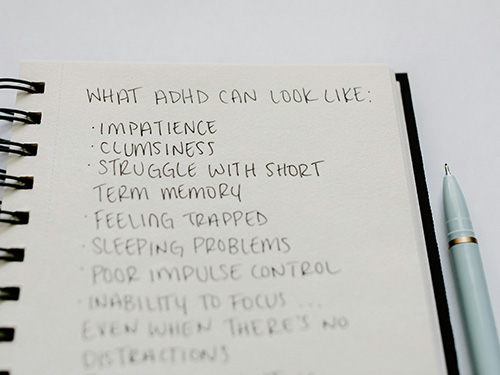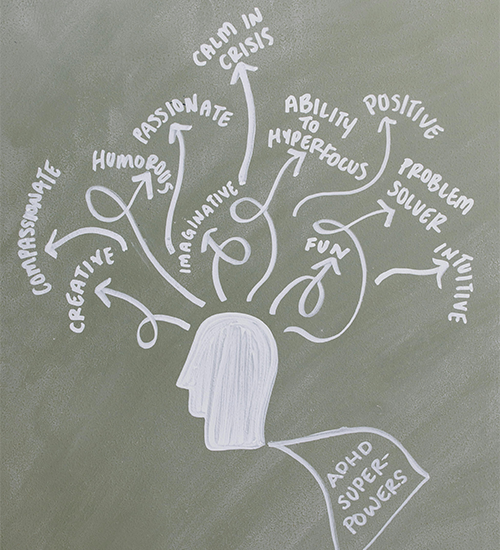(Posted 2024 March)
 Parenting a child with ADHD can be challenging and even overwhelming at times. There is a lot of pressure on parents and caregivers to help your child complete tasks and maintain focus in the classroom or similar settings.
Parenting a child with ADHD can be challenging and even overwhelming at times. There is a lot of pressure on parents and caregivers to help your child complete tasks and maintain focus in the classroom or similar settings.
So, the Parenting Education Programs is offering some information about ADHD symptoms, treatment options, and brain tricks to help your child(ren) thrive.
What is ADHD?
 Attention-deficit/hyperactivity disorder or ADHD is a neurodevelopmental disorder that causes problems with regulating (or controlling) one’s attention and feelings. It often shows up as a deficits in executive functioning, which refers to the processes for managing thoughts, actions, and emotions to achieve goals.
Attention-deficit/hyperactivity disorder or ADHD is a neurodevelopmental disorder that causes problems with regulating (or controlling) one’s attention and feelings. It often shows up as a deficits in executive functioning, which refers to the processes for managing thoughts, actions, and emotions to achieve goals.
So what does that look like for real people in real life? Here are some common characteristics and behaviors of someone with executive function deficits:
Procrastination
Short term memory issues
Forgetfulness
Missed deadlines
Mood swings
Poor time management
Distractedness
Losing things
No follow through with tasks
Disorganization
Overwhelm
Poor concentration
Scheduling issues
Hyperfocus
The Impact of ADHD
People with ADHD often face challenges related to several of these executive function deficits simultaneously. It’s easy to see why someone with ADHD might struggle with some everyday tasks that others consider simple.
 Living with these challenges can lead to feelings of anxiety, shame, and fatigue which in turn exacerbate the ADHD symptoms. It’s important for parents and caregivers to respond with patience, compassion, support, and hope rather than condemnation and frustration.
Living with these challenges can lead to feelings of anxiety, shame, and fatigue which in turn exacerbate the ADHD symptoms. It’s important for parents and caregivers to respond with patience, compassion, support, and hope rather than condemnation and frustration.
It might help to remember that many of those ADHD behaviors listed above can be reframed as positive traits such as innovative thinking, adaptability, expressiveness, perseverance, boundless energy, and resilience. Part of a parent or caregiver’s role is helping children learn how to tap into that ADHD power while managing the challenges.
Strategies for ADHD and Executive Function
The good news is that there are a variety of strategies to help manage the symptoms of ADHD. Since every child with ADHD is unique, you might have to try more than one to find the best ways to support your child to manage their ADHD.
 ADHD clinical treatments can include these evidence-based therapies listed below. For more information about therapeutic options, have a conversation with your child’s pediatrician:
ADHD clinical treatments can include these evidence-based therapies listed below. For more information about therapeutic options, have a conversation with your child’s pediatrician:
- Cognitive Behavioral Therapy (CBT) involves identifying intrusive negative thoughts which are distortions of reality.
- Dialectical Behavior Therapy (DBT) helps those with anxiety and ADHD manage their overwhelming emotions.
- Mindfulness and Meditation CBT brings awareness and focus to reach a state of calm.
With your support, there are also some Brain Tricks your child can use to manage their ADHD symptoms and strengthen their executive functioning:
- Engage the brain by doing 10 minutes of physical activity before beginning homework or work.
- Find an accountability partner to support efforts – this could be a tutor, parent, or caregiver.
- Minimize distractions – put phones and personal devices on silent or put them away.
- Set small attainable goals and keep engaged by tracking progress toward goals.
 Provide rewards at intervals while working.
Provide rewards at intervals while working.- Break up a big task into smaller chunks.
- Manage tasks with to-do lists, sticky notes, or phone reminders.
- Establish routines for getting things done at specific times.
- Set alarms as a reminder to take breaks (to eat, sleep, etc.)
- Identify your distractions and create self-interventions for when your mind wanders.
For more advice like this, the Parenting Education Programs will be offering several upcoming Parent Cafés and classes in the spring and summer. Join us for more information about positive and effective ways parents and caregivers can interact with their children at every age and stage of development.
We would love to hear from you. If you have questions or feedback about the topic in this article, email us.
This posting is part of the Department of Family Services' Community Corner where you’ll find timely information about upcoming events, parenting and wellness tips, programs and services, and more! Share these helpful posts with your friends and family. Don't miss out on future postings! Sign up today!

